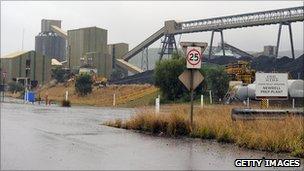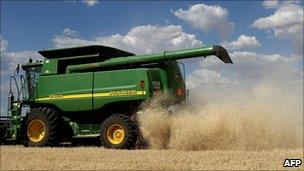Australia's floods disrupt commodity supplies
- Published

Prime Minister Julia Gillard says recovery will take a significant amount of time
As flooding in Australia disrupts supplies of coal, wheat and sugar, markets have become nervous and people are asking if this could herald a new food crisis in 2011.
An area greater than the size of France and Germany combined is currently under water as Australia is confronted with its worst flooding for more than half a century.
According to Queensland's State Treasurer Andrew Fraser, the impact on the country's economy will be significant.
"It will run into billions not millions of (Australian) dollars," he says, "And that is not just from the repairs and the losses that the government will face in terms of rebuilding towns and rebuilding infrastructure which has been washed away.
"Mines are flooded, railway lines are cut and many bridges have been damaged. The long-term effect of the flooding will be significant on the economy."
Flooded facilities
According to the Paris-based International Energy Agency, Australia exported an estimated 259 million tonnes of coal in 2009.
Australia is the world's largest exporter of coking coal, used for producing steel.
The country supplies over half the global market, with a large proportion of that coming from Queensland.
Spot prices for coking coal on the international markets have risen by 10% in the past month and traders are anticipating a very sharp rise over the next few weeks.
With rail and bridges damaged, it could take weeks or even months to get them repaired and during that period prices are likely to rise even more.
"Prices will rise significantly but will eventually ease back again once production gets back into full swing," says David Brewer of the Confederation of UK Coal Producers.
At the moment the biggest concern is moving coal from the mines in Queensland to the export ports. Many of those links are under water and it is still raining - with yet more forecast.
Alternative supplies
Some of the bigger companies, such as Rio Tinto and BHP Billiton, with an annual production capacity of more than 90 million tonnes, can declare force majeure, which means they will not suffer any contractual financial penalties
Suppliers can declare force majeure when unforeseen circumstances, such as bad weather, mean they cannot meet contractual obligations.
The major Queensland coal port of Dalrymple resumed coal export shipments on Saturday, but there are 44 ships offshore waiting to be loaded. A spokesman says that the terminal is receiving coal, but at a much reduced rate.
Meanwhile, Gladstone Ports Corporation says that its Tanna coal export terminal is operating at a fraction of capacity after it stopped receiving coal supplies from inland mines last week.
The disruption to coking coal supplies can be offset partially by output from by mines in Russia, Poland, the Czech Republic, Canada and the US.
Because of the shortage of suppliers of coking coal, the Indian conglomerate Tata has already begun exploratory drilling in South Wales, whilst another of its projects is already further advanced in Mozambique.
Farms washed out
Australia is the world's fourth largest wheat exporter.
Queensland produces about 5% of the country's wheat and until a few weeks ago, the extra rainfall was very welcome and the state looked as though it was on course to produce a bumper harvest.
But the storms, sometimes producing up to 100mm of rain, have damaged the crop.
"A significant proportion of wheat has been destroyed," Wayne Newton, president of the Agforce farmer's lobby group, told the BBC World Service's World Business News.
"What has been retrieved has been downgraded to animal feed and will not be used for making bread."
Australian exports are critical for food supplies to markets in Asia - particularly in India, Bangladesh and Japan.
The prospect of a bumper harvest encouraged a lot of farmers to forward-sell their crops, but now they cannot actually deliver.
"There will be a financial penalty for those growers to get out of those contracts," Mr Newton told the BBC.

Australian farmers suffered several years of drought prior to the latest flooding
"Some farmers will be able to weather the crisis because they have enough equity in their farming business and properties to borrow more money and carry on," he said.
After several years of drought, and now the current problems, some farmers will not be able to continue.
Mr Newton said: "There is no doubt there will be a significant number of farmers who elect to leave the industry."
A shortage of wheat for bread will lead to higher prices. Wheat prices are already 50% higher than they were a year ago.
Prices for wheat, sugar, corn and oil seeds are already at their highest since the food crisis of 2007-2008.
As prices continue to rise in the international market, processors and supermarkets are likely to start passing those increases onto the consumers.
Sugar price
Australia has cut its forecast for sugar exports this year by 25% as flooding has reduced the sugar content of the cane.
The damage has helped to propel sugar prices to 30-year highs and has forced the nation's biggest sugar exporter, Queensland Sugar, to buy more raw sugar from Brazil and Thailand to fulfil its own export orders.
Cotton has also been affected but not by as much as other commodities.
Mr Newton said he expected cotton growers to suffer a 20-25% loss, compared with wheat growers who could face losing 90% of their produce.
- Published4 January 2011
- Published4 January 2011